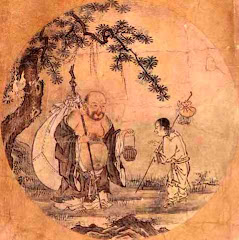
Courage means going into the unknown in spite of all the fears. Courage does not mean fearlessness. Fearlessness happens if you go on being courageous and more courageous. That is the ultimate experience of courage -- fearlessness; that is the fragrance when the courage has become absolute. But in the beginning there is not much difference between the coward and the courageous person. The only difference is, the coward listens to his fears and follows them, and the courageous person puts them aside and goes ahead. The courageous person goes into the unknown in spite of all the fears. He knows the fears, the fears are there.
When you go into the uncharted sea, like Columbus did, there is fear, immense fear, because one never knows what is going to happen and you are leaving the shore of safety. You were perfectly okay, in a way; only one thing was missing -- adventure. Going into the unknown gives you a thrill. The heart starts pulsating again; again you are alive, fully alive. Every fiber of your being is alive because you have accepted the challenge of the unknown.
To accept the challenge of the unknown in spite of all fears, is courage. The fears are there, but if you go on accepting the challenge again and again, slowly slowly those fears disappear. The experience of the joy that the unknown brings, the great ecstasy that starts happening with the unknown, makes you strong enough, gives you a certain integrity, makes your intelligence sharp. For the first time you start feeling that life is not just a boredom but an adventure. Then slowly slowly fears disappear; then you are always seeking and searching for some adventure.
But basically courage is risking the known for the unknown, the familiar for the unfamiliar, the comfortable for the uncomfortable arduous pilgrimage to some unknown destination. One never knows whether one will be able to make it or not. It is gambling, but only the gamblers know what life is.
Intelligence is aliveness; it is spontaneity, it is openness, it is vulnerability, it is impartiality, it is the courage to function without conclusions. And why do I say it is a courage? It is a courage because when you function out of a conclusion the conclusion protects you, the conclusion gives you security, safety. You know it well, you know how to come to it, you are very efficient with it. To function without a conclusion is to function in innocence. There is no security, you may go wrong, you may go astray.
One who is ready to go on the exploration called truth has to be ready also to commit many errors, mistakes, has to be able to risk. One may go astray, but that is how one arrives. Going many many times astray, one learns how not to go astray. Committing many mistakes one learns what is a mistake, and how not to commit it. Knowing what is error, one comes closer and closer to what is truth. It is an individual exploration; you cannot depend on others' conclusions.







